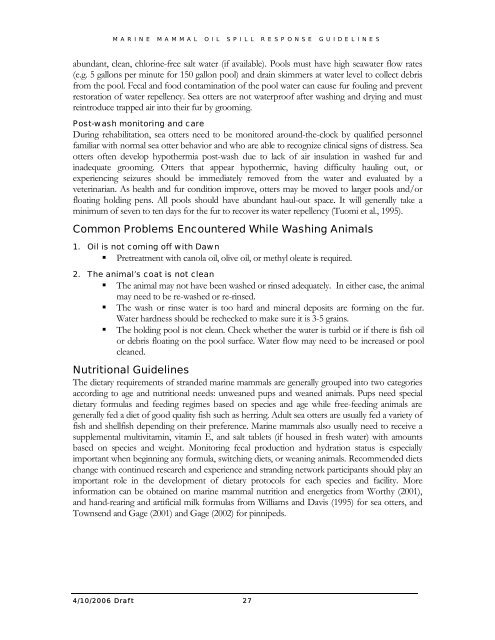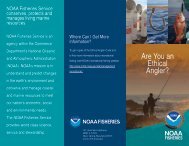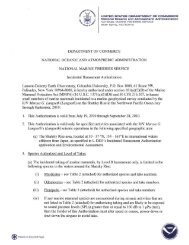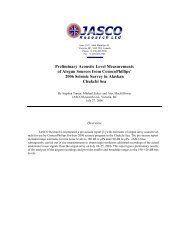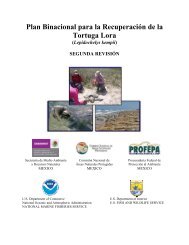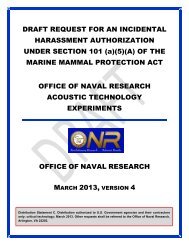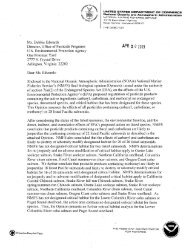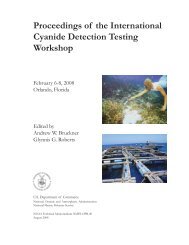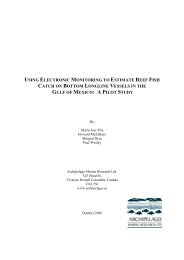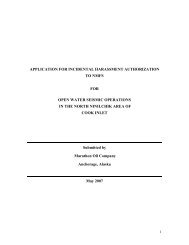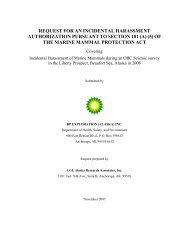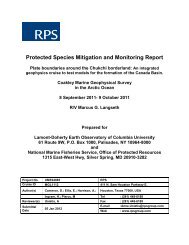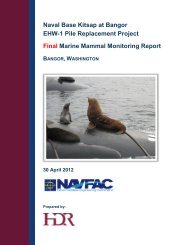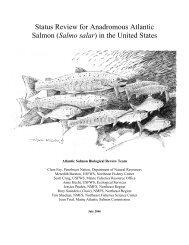Volume III, Appendices EM - National Marine Fisheries Service ...
Volume III, Appendices EM - National Marine Fisheries Service ...
Volume III, Appendices EM - National Marine Fisheries Service ...
You also want an ePaper? Increase the reach of your titles
YUMPU automatically turns print PDFs into web optimized ePapers that Google loves.
MARINE MAMMAL OIL SPILL RESPONSE GUIDELINES<br />
abundant, clean, chlorine-free salt water (if available). Pools must have high seawater flow rates<br />
(e.g. 5 gallons per minute for 150 gallon pool) and drain skimmers at water level to collect debris<br />
from the pool. Fecal and food contamination of the pool water can cause fur fouling and prevent<br />
restoration of water repellency. Sea otters are not waterproof after washing and drying and must<br />
reintroduce trapped air into their fur by grooming.<br />
Post-wash monitoring and care<br />
During rehabilitation, sea otters need to be monitored around-the-clock by qualified personnel<br />
familiar with normal sea otter behavior and who are able to recognize clinical signs of distress. Sea<br />
otters often develop hypothermia post-wash due to lack of air insulation in washed fur and<br />
inadequate grooming. Otters that appear hypothermic, having difficulty hauling out, or<br />
experiencing seizures should be immediately removed from the water and evaluated by a<br />
veterinarian. As health and fur condition improve, otters may be moved to larger pools and/or<br />
floating holding pens. All pools should have abundant haul-out space. It will generally take a<br />
minimum of seven to ten days for the fur to recover its water repellency (Tuomi et al., 1995).<br />
Common Problems Encountered While Washing Animals<br />
1. Oil is not coming off with Dawn<br />
Pretreatment with canola oil, olive oil, or methyl oleate is required.<br />
2. The animal’s coat is not clean<br />
The animal may not have been washed or rinsed adequately. In either case, the animal<br />
may need to be re-washed or re-rinsed.<br />
The wash or rinse water is too hard and mineral deposits are forming on the fur.<br />
Water hardness should be rechecked to make sure it is 3-5 grains.<br />
The holding pool is not clean. Check whether the water is turbid or if there is fish oil<br />
or debris floating on the pool surface. Water flow may need to be increased or pool<br />
cleaned.<br />
Nutritional Guidelines<br />
The dietary requirements of stranded marine mammals are generally grouped into two categories<br />
according to age and nutritional needs: unweaned pups and weaned animals. Pups need special<br />
dietary formulas and feeding regimes based on species and age while free-feeding animals are<br />
generally fed a diet of good quality fish such as herring. Adult sea otters are usually fed a variety of<br />
fish and shellfish depending on their preference. <strong>Marine</strong> mammals also usually need to receive a<br />
supplemental multivitamin, vitamin E, and salt tablets (if housed in fresh water) with amounts<br />
based on species and weight. Monitoring fecal production and hydration status is especially<br />
important when beginning any formula, switching diets, or weaning animals. Recommended diets<br />
change with continued research and experience and stranding network participants should play an<br />
important role in the development of dietary protocols for each species and facility. More<br />
information can be obtained on marine mammal nutrition and energetics from Worthy (2001),<br />
and hand-rearing and artificial milk formulas from Williams and Davis (1995) for sea otters, and<br />
Townsend and Gage (2001) and Gage (2002) for pinnipeds.<br />
4/10/2006 Draf t 27


